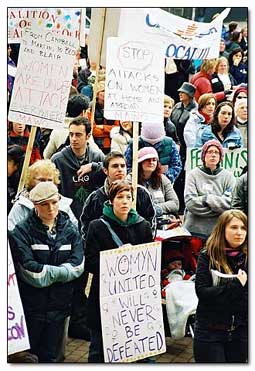
Ten months from now a provincial election will be underway. So the "good news" announcements have started to flow from Victoria. The BC Liberals need to stop their slide in the opinion polls and convince the voters that they really do care about health and education if they're going to win a second term.
As the election gets closer, the trickle of such announcements will swell to a deluge. Finance Minister Gary Collins has made it clear that his next budget--the last before the May 2005 election--will be full of positive news.
It's the oldest political trick in the book: make "good news" announcements and increase the chances of success on election day. Improving education for our children is popular; cleaning up the environment is popular; buying better medical equipment for hospitals is popular. Strategists hope that some of the popularity of the actions will rub off on the politicians making them.
However the BC Liberals face two large barriers as they embark on this time-worn strategy. And it is unclear whether all the "good news" will really have the desired effect.
Education sore spots
The first barrier is the bleak backdrop of reduced services against which the announcements will be made. Over one hundred schools have been shut down across the province. The BCTF estimates that there are some 3,000 fewer teachers in BC's public schools now than in 2001. Tuition for college and university students has nearly doubled in three years. Can announcements of more resources for teachers and more support for students reverse the perception that education has suffered under the Liberal administration?
The situation in health is similar. Although budgets for health have been increased, not cut, waiting lists have ballooned to unacceptable lengths. Private clinics providing thinly veiled opportunities for queue-jumping have expanded. Long-term care facilities for seniors have been closed, causing anguish to individuals and families and prompting a slew of heart-wrenching media stories. Will further commitments to improved funding and services overcome the feeling that this government is intent on starving public health services and turning them over to the private sector?
And little of the "good news" to be announced will actually be implemented prior to election day. In some areas of government, cuts are still underway. The realities facing students and educators, patients and health care providers seem bleak. The promises the government will make will be at odds with what it has done in office. Will voters judge the government on its record, or on promises of better behaviour in the future?
Campbell's high negatives
The second barrier to the success of the "good news" announcement strategy is Gordon Campbell's unpopularity. Nearly two-thirds of voters are unhappy with his performance as Premier. He has, as pollsters say, very high negatives.
His unpopularity reduces the effectiveness of any "good news" announcement he makes. Think about it: when a person we dislike tells us something, even if it's something we want to hear, we're less likely to welcome the news--or even believe it.
For political leaders the situation may even get so bad that, instead of the popularity of "good news" announcements rubbing off on the politician making them, the unpopularity of the politician will actually sour the "good news."
Was Bill VanderZalm believed when he pledged improvements to college and university education? Did voters decide to forgive Glen Clark when he announced he'd eliminate one-half the portable classrooms in the province? Both promises were actually implemented. But neither helped the political leader regain popularity.
Gordon Campbell could be in the same position. He's putting himself at the centre of almost every "good news" announcement government has made. But voter distaste for Mr. Campbell reduces the impact of those announcements and could even turn positives into negatives.
Liberal strategists hope that ten months of "good news" from government will reverse public perceptions of the government and restore Mr. Campbell's popularity. However, the government's own record and Mr. Campbell's unpopularity make the success of such a strategy far from certain.
Paul Ramsey is a former MLA and Cabinet Minister. He now teaches at CNC and is a Visiting Professor in the Political Science Program at UNBC.
![]()















Tyee Commenting Guidelines
Comments that violate guidelines risk being deleted, and violations may result in a temporary or permanent user ban. Maintain the spirit of good conversation to stay in the discussion.
*Please note The Tyee is not a forum for spreading misinformation about COVID-19, denying its existence or minimizing its risk to public health.
Do:
Do not: